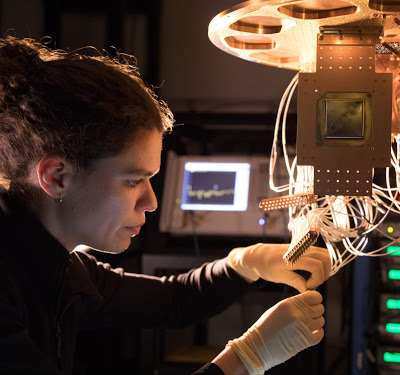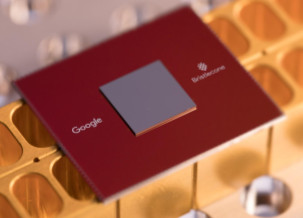| Google Announces 72-Qubit Machine |
| Written by Mike James |
| Monday, 05 March 2018 |
|
Google's Quantum AI Lab has just announced Bristlecone its new 72-qubit processor, another step towards its goal to build a quantum computer that can be used to solve real-world problems. Google's latest quantum computer is based on its previous 9-qubit Bristlecone design which produces low error rates. The new device has a grid of qubits with nearest neighbor connectivity. No information on the error rates for the new device have been presented, but the team expects similar performance from the larger device. In principle, the new machine is still within the range of simulation by classical computers, but the team is hoping that even with just 72-qubits it should be possible to settle the quantum supremacy question. The point is that while quantum computers are theoretically better than classical ones, there could be real world constraints that mean that this advantage cannot be achieved. What this means is that at the moment most quantum computer research teams and commercial concerns are building machines that really don't do anything new and which might never do anything new. "Although no one has achieved this goal yet, we calculate quantum supremacy can be comfortably demonstrated with 49 qubits, a circuit depth exceeding 40, and a two-qubit error below 0.5%. We believe the experimental demonstration of a quantum processor outperforming a supercomputer would be a watershed moment for our field, and remains one of our key objectives. "
More InformationA Preview of Bristlecone, Google’s New Quantum Processor Related ArticlesNobel Prize For Computer Chemists Solve The Riemann Hypothesis With A Quantum Computer Boson Sampling Tests Quantum Computing A Quantum Computer Finds Factors The Revolution In Evolutionary Game Theory - Prisoners Dilemma Solved? $100,000 Prize For Proving Quantum Computers Are Impossible To be informed about new articles on I Programmer, sign up for our weekly newsletter, subscribe to the RSS feed and follow us on Twitter, Facebook or Linkedin.
Comments
or email your comment to: comments@i-programmer.info |
| Last Updated ( Sunday, 10 March 2019 ) |




